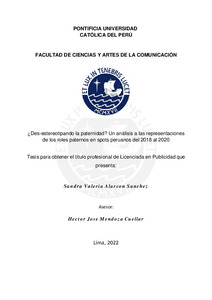| dc.contributor.advisor | Mendoza Cuellar, Hector Jose | |
| dc.contributor.author | Alarcon Sanchez, Sandra Valeria | |
| dc.date.accessioned | 2023-05-23T22:35:22Z | |
| dc.date.available | 2023-05-23T22:35:22Z | |
| dc.date.created | 2022 | |
| dc.date.issued | 2023-05-23 | |
| dc.identifier.uri | http://hdl.handle.net/20.500.12404/25020 | |
| dc.description.abstract | Por muchos años, la representación de la paternidad ha sido invisibilizada, anclada a roles
tradicionales y reducida a una difusión netamente coyuntural, a pesar de esto la publicidad
peruana comienza a mostrar iniciativas de cambio para replantear el discurso alrededor de una
paternidad más involucrada en el espacio privado y afectivo de la familia. A partir de ello, la
presente investigación busca conocer las representaciones de los roles paternos que identifican
los padres limeños de 28-50 años en el discurso publicitario de los spots seleccionados. Para el
cumplimiento de dicho objetivo se ha recurrido al análisis del discurso publicitario, a la técnica
del focus group y las entrevistas a profundidad con expertos. Concluyendo, principalmente,
que los padres aún identifican en la publicidad representaciones tradicionalistas como la del
padre inexperto y poco afectivas. No obstante, también reconocen representaciones más
positivas, padres más participativos en el hogar y en la crianza de los hijos, pero señalaron que
estos discursos publicitarios todavía guardan atributos que se muestran superficiales y
estereotipados. | es_ES |
| dc.description.abstract | For many years, the representation of fatherhood has been made invisible, anchored to
traditional roles and reduced to a purely conjunctural diffusion, despite this, Peruvian
advertising is beginning to show initiatives for change to reframe the discourse around a
fatherhood more involved in the private and emotional space of the family. From this, the
present investigation seeks to know the representations of the paternal roles that identify Lima
parents aged 28-50 years in the advertising discourse of the selected spots. To fulfill this
objective, the analysis of the advertising discourse, the focus group technique and in-depth
interviews with experts have been required. Concluding, mainly, that parents still identify
traditionalist representations in advertising such as that of the inexperienced and little affective
father. However, they also present more positive representations, more participatory fathers
at home and in raising children, but they pointed out that these advertising discourses still have
attributes that appear superficial and stereotyped. | es_ES |
| dc.language.iso | spa | es_ES |
| dc.publisher | Pontificia Universidad Católica del Perú | es_ES |
| dc.rights | info:eu-repo/semantics/closedAccess | es_ES |
| dc.subject | Paternidad--Perú | es_ES |
| dc.subject | Publicidad--Representaciones sociales | es_ES |
| dc.subject | Lenguaje publicitario | es_ES |
| dc.title | ¿Des-estereotipando la paternidad? Un análisis a las representaciones de los roles paternos en spots peruanos del 2018 al 2020 | es_ES |
| dc.type | info:eu-repo/semantics/bachelorThesis | es_ES |
| thesis.degree.name | Licenciado en Publicidad | es_ES |
| thesis.degree.level | Título Profesional | es_ES |
| thesis.degree.grantor | Pontificia Universidad Católica del Perú. Facultad de Ciencias y Artes de la Comunicación. | es_ES |
| thesis.degree.discipline | Publicidad | es_ES |
| renati.advisor.dni | 06805496 | |
| renati.advisor.orcid | https://orcid.org/0000-0002-8005-7239 | es_ES |
| renati.author.dni | 73656005 | |
| renati.discipline | 414166 | es_ES |
| renati.juror | Cassano Iturri, Giuliana | es_ES |
| renati.juror | Mendoza Cuellar, Hector Jose | es_ES |
| renati.juror | Tello Giusti, Carolina | es_ES |
| renati.level | https://purl.org/pe-repo/renati/level#tituloProfesional | es_ES |
| renati.type | https://purl.org/pe-repo/renati/type#tesis | es_ES |
| dc.publisher.country | PE | es_ES |
| dc.subject.ocde | https://purl.org/pe-repo/ocde/ford#5.08.00 | es_ES |






